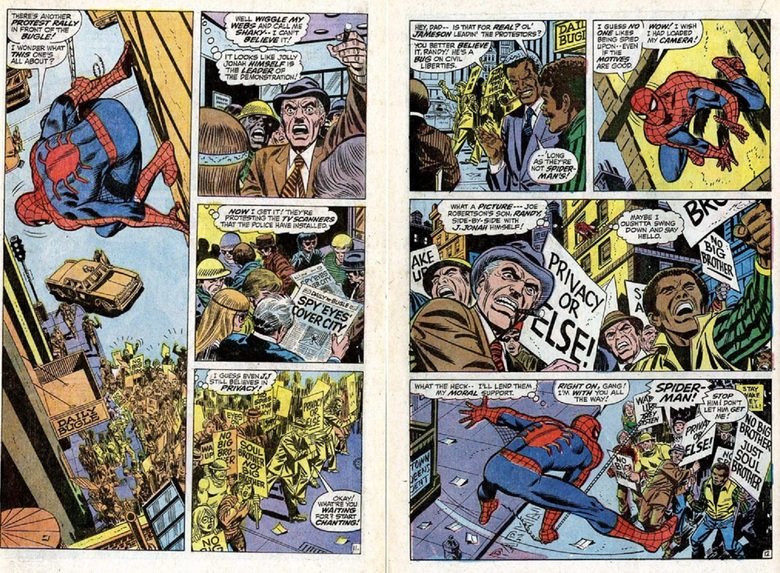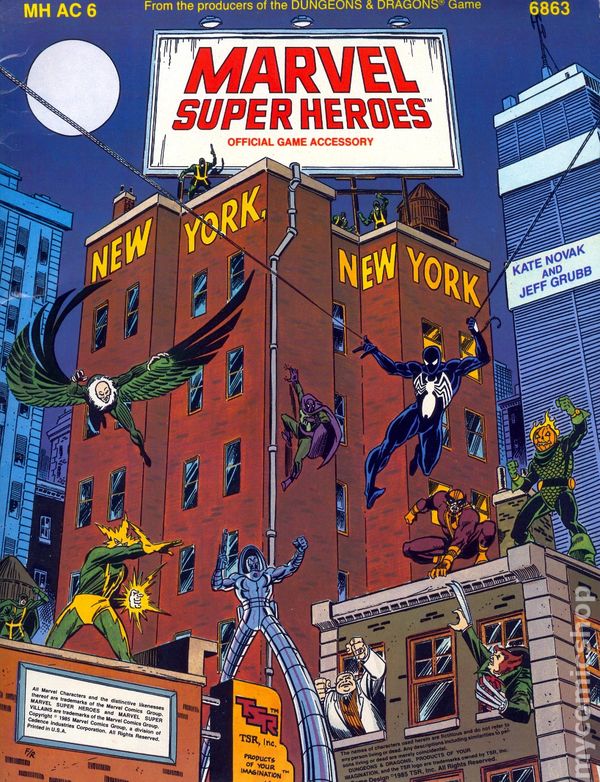 |
| Let's play! |
So this post may be a bit all over the place and random, as my thoughts are a bit scattered on the subject, but I will at least try to cram as much stuff in as I can that I have located on the subject of, and that I'd like to use for, a Superhero Open World Sandbox Hexcrawl, along with my ramblings on the subject.
First, I had a bit of a revelation in the past couple weeks thinking on my beloved
Champions. I have a suspicion that one of the great unsung heroes of
Champions game design could end up being a crucial piece of the type of game I'm looking to play. I'm talking about
Disadvantages.
If you're not familiar with Hero System games, character creation is a point buy system. You're given a starting number of points for free, but in order to have enough to build an average character you have to make up the balance with Disadvantages. It's a neat system that helps build a background for your character while handing the GM juicy plot hooks.
There are a couple of types among the various Disadvantages that I have in mind in particular. These are
Hunted's and
Dependent NPC's
Hunted's are individuals or organizations that are actively pursuing your character.
Dependent NPC's are those regular folks who rely on the hero for their care and well being. There are a few different criteria that determine how many points you earn for both (how weak or capable they are, and so on), but the one I have in mind is FREQUENCY. Both of them have a chance of showing up each session (8, 11, & 14 or less on 3d6), rolled by the GM. An appearance need not mean combat or endangerment, just that person(s) will figure into the session somehow.
I always thought this was one of the areas
Champions outshone the competition, and always felt like games like
Marvel Superheros could have used it. ( Aunt May, Dependent NPC: Amazing (50). Red roll? Uh-Oh, Aunt May is going to be in danger! Maybe Green is a phone call, Yellow a personal appearance, that sort of thing).
If I end up playing
Champions this isn't a problem, but regardless of system, I want to front load my sessions with a chance of Hunted's, Dependent NPC's, and the like. These could then be worked in when relevant results show up on your Random Encounter Tables (see below), or when your Game Master Emulator of choice (like
Mythic GME) throws you a Random Event or an Altered/Interrupted Scene, and so on.
(This may not be much of a "revelation" for most, but it was for me, in that as kids we never really used ALL the rules from
Champions (
Endurance, I'm looking at you!). We were pretty lazy about Hunted's, Dependent NPC's and so on. If we were running an adventure with Genocide, and you're HUNTED by them, well, they're going to target YOU. Otherwise, we just ignored them. We we kids...)
***
Next, I'll address a question that seems to come up a lot in various online discussions I've Googled up on the subject, which is: why does a Supers game NEED a hexcrawl in the first place? It's not a bad question.
For me at least, it all goes back to subjects I've discussed in previous posts: Immersion, realism, simulation, verisimilitude. I want the world to feel REAL. INTERACTIVE. Not only do I want a GAME MASTER EMULATOR for solo play, I want a WORLD emulator as well.
It would be pretty easy to just plunk the hero down in the city and roll up a random encounter. But I want more of a city that feels like it has all these things going on around me.
SO...that said, simple random encounter tables aren't enough for me. As I'm patrolling different parts of the city, I want greater or lesser chances of encounters, types of crimes, that sort of thing. IMO this will help make the city feel REAL and ALIVE.

One of the games I've heard recommended a lot for this style of play is also the FIRST Supers game:
Superhero 2044. It incorporates planning sheets for you to block out how your hero spends their time and charts to roll on for patrols and so on. Very simulation-ish. Okay, sounds promising.
I managed to track down a PDF. The results...? Well...I got a headache, and a couple of nifty charts anyway...

I won't go into much detail on how these are used in the game, as I STILL don't quite grok how it works, other than to say it all boils down to a random die roll to see if you stop the crime, make a conviction, and so on, with a bunch of modifiers and mathematical formulas. Snore.
BUT, that chart for determining types of crime by area patrolled is pretty awesome. It reminds me of another one I found at
Republic of Replicants from the
DC Heroes RPG supplement
Night In Gotham:
Add that to this map from
IO9 that is keyed with the 24 boroughs on the chart above:
And you're off to a great start on prowling the city looking for crime.
***
Marvel Superheroes has a pretty good one too, in the accessory
New York, New York
that you can get for free at
Classic Marvel Forever
This one runs more of a gamut, incorporating
Daily Life,
Miscellaneous Crimes,
Robberies,
Burglaries,
Rampage,
Vendetta,
Organized Crime, and
Catastrophes. It's closer to what I think of as a Random Encounter chart.
Which brings me to
Random Encounters. I have nothing against them. Heck, I love them. I think they're just the spice a sandbox needs. So while the ones above and to the right would be good for "hex stocking" tables as you move through the city, I also think a Supers Open World Sandbox Hexcrawl would need true Random Encounters.
In my mind the Random Encounters in this type of game would be more of your "big" encounters. Supervillain attacks, Alien Invasions, and so on.
Fortunately there are several good ones I've scoured up in my searches of the internet like the
DC Heroes RPG one linked to above at
Republic of Replicants or here's a good one for sale at
Drive Thru RPG...
Worlds of Pulp: Generic Random Event tables for Super Heroes
The thing that makes the Wandering Monster/Random Encounter work in D&D is the simple 1 in 6 on d6 (or 1-2 in some cases). So I'm picturing something like that here. Each "hex" (borough, neighborhood, whatever) you move into or through you would check on your Patrol Encounter Table. No crime in the area? Roll for Random Encounter. If one is generated, roll on Random Encounter Table.
I haven't decided on frequency though. In D&D, for Wilderness you check 3-4 times per day. In a Dungeon it's every other turn for Wandering Monsters. Every other "hex" could be a good metric here?
***
So, overall the basic procedure would look something like:
1. Check for Hunted's, Dep NPC's etc. at beginning of session.
2. Roll on Patrol Encounter table for each "area" moved through/entered.
3. If no Patrol Encounter generated, roll for Random Encounter every other "area".
Between this procedure and all the randomness your GM Emulator of choice (like Mythic) throws at you, plus any and all other oracles you might employ ( like Rory's Story Cubes) SOMETHING has to happen! If not either you're not looking hard enough for trouble, or it just wasn't meant to be. Go back home and go back to bed.
Needless to say, all of this is only if you're just out patrolling the city, on your way to work, whatever. If you have a specific mission or agenda from a previous session or whatever then obviously that would take precedent (unless you WANT to add the chance of added complications. Could be fun!)
***
As a bonus, here is my collection of all the most useful blog posts and downloads that I've gathered on the subject (in addition to the ones already posted above!).
Blog post on Superhero Sandboxes by Jeff Rients
Alien Shores blog posts on Sandbox superhero campaigns (3 parts. Recommended!)
Rogues and Reavers blog: New York, New York inspired Campaign Frames














